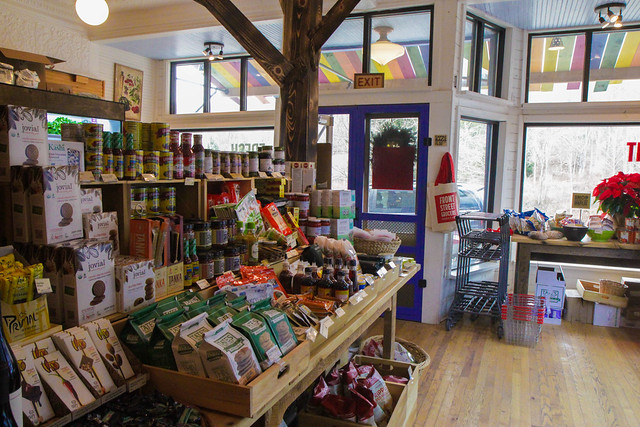 I fell in love with the local grocery in Thomas. Front Street Grocers and Kitchen features lots of local items from farmers and additional organic items.
I fell in love with the local grocery in Thomas. Front Street Grocers and Kitchen features lots of local items from farmers and additional organic items.
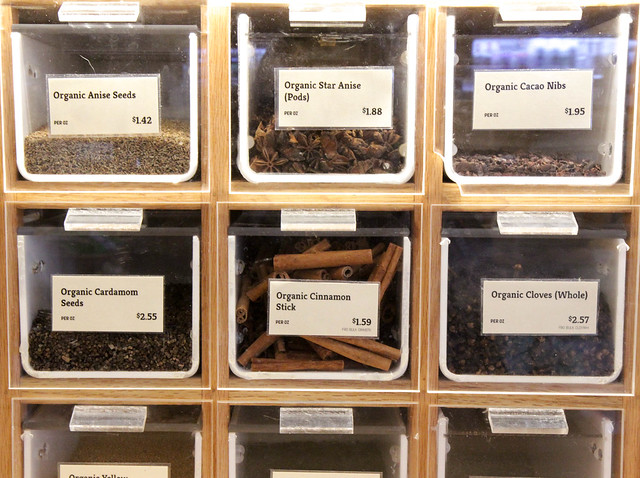
Neighborhood grocery & kitchen with over 100 fresh organic vegetables and fruits, pantry staples, beer, wine, prepared foods & snacks, 150 + spices, herbs, grains and legumes, vegetarian and vegan items, grass-fed & pastured meats, dairy and eggs.
Food service on Saturdays. Soup on Sundays.
Founded by Justin Doak, Trevor Reichman, Corey Bonasso & Eva Gutierrez.
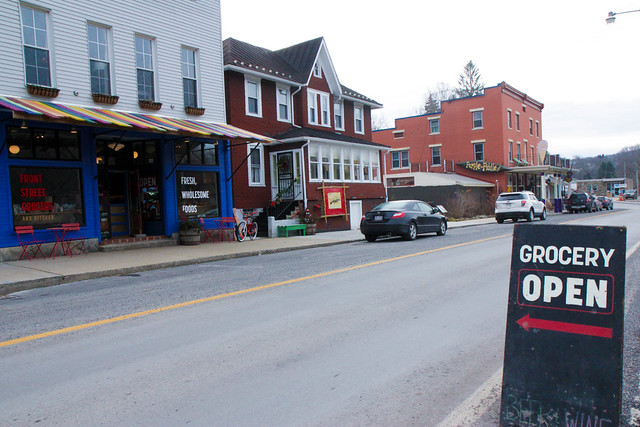 The shop is brilliantly vibrant with fresh veggies, fruits and so many packaged items, as well. I got some cauliflower soup to go, and that was tasty! And, an Asian brassica salad - also good!
The shop is brilliantly vibrant with fresh veggies, fruits and so many packaged items, as well. I got some cauliflower soup to go, and that was tasty! And, an Asian brassica salad - also good!So, I talked with the owners about why they're doing what they're doing, and it's just an absolutely wonderful endeavor. I talked with one of the owners for my column, but I wasn't able to use every piece, so I thought I would post our full Q&A here!
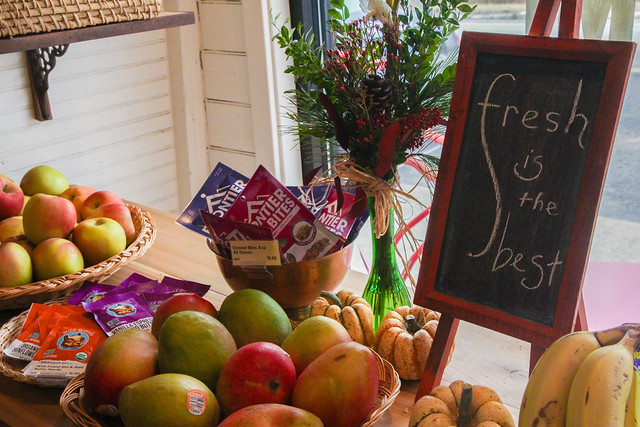
What made you all want to start a local grocery store?
It really came down to two things: 1. Every viable township and/or city deserves to have their own grocery and/or market. Thomas is reclaiming its place once again as a viable activity center — both in the arts and basic community services/needs. We have a surprising amount of businesses for a town of 500 residents and a grocery store was a missing piece. 2. Provide the community with year-round, convenient access, to organic & pesticide free foods. It’s not just about produce. But access to organic spices and grains in bulk, as well as many other categories that were not available in our area. Many of us were driving hours to access what we needed for our kitchen. Instead of the weekly or bi-weekly HUGE grocery run - people can stop in, grab what they need for that night or day, and come back again the next. We are seeing that more and more. Small local shops allow people to shop incrementally vs. hoarding food. This generates less food waste and ensures people are eating fresh, preservative free food. This type of food shopping just makes sense to us.
Who are the owners (names), and where are they from?
1. Front Street Grocers emerged from the shared vision of four co-founders. Justin Doak, Trevor Reichman, Corey Bonasso & Eva Gutierrez. This is a privately funded venture. Justin Doak was the investor yet all of us play a vital role in the business. We all built it from the ground up.
2. Justin Doak. Born in Jane Lew, WV. Been living out of state for nearly 20 years with residence in Pittsburgh, D.C. and most recently Austin, TX.
3. Trevor Reichman. Born in Johannesburg, South Africa. Grew up in Houston, TX and shares his time between Thomas and Terlingua, TX.
4. Corey Bonasso. Born in Fairmont, WV. Resident of Thomas for several years.
5. Eva Gutierrez. Grew up in Idaho and Florida. Resident of West Virginia for 10 years now.
Why choose Thomas for this venture?
1. Corey & Eva had previously owned and operated a shop in the space where the grocery is currently located. That business was called Salud.
2. When Justin & Trevor relocated to Thomas they bought the building that Salud was a tenant in and the future home of Front Street Grocers.
3. We all got along well and had a similar vision of being a hub around fresh, wholesome foods. We opted to work together to do a major remodel to best accommodate a large mix of groceries for a smaller space in a historic building.
4. Justin visited the area since he was a kid - we used to camp often in the area as a family. Justin’s mom also owns a shop called the Picket Patch in Thomas, so he’s been coming to Thomas for many years and watched the town slowly rebuild itself. The energy, the ideas, the people have continued to spark over the years - but it’s really become a creative class town. People are investing time, energy, creative passion, and what money they have into building the type of life they seek. While our grocery format might be a bit early to be supported by the erratic foot traffic in Thomas - it seemed like the right time to get started and see where the business took us and where we could take it.
5. Thomas might be small, but it packs a lot of punch. People are civically engaged, environmentally conscious, they are boot strapping and have built their business, art or craft from the ground up. It’s the perfect bed to start an independent business because we all are growing up together and supporting one another. This personality is not confined to Thomas, but the entire region. We built this business with the community in mind.
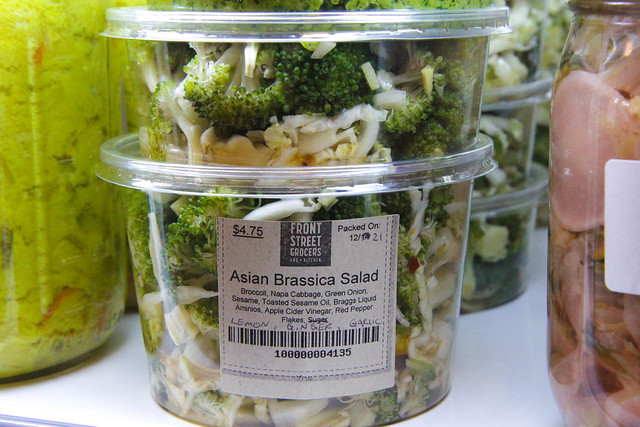
How do you support local farmers (whether through fresh produce or value-added products)?
We opened at the end of October - so just at the tail end of the growing season for many of our local farmers. So right now, our mix of local items is on the lower end. However, we currently source local cheese, syrup, honey, greens, all our chicken, beef & pork, winter squash and winter storage vegetables from a mix of local farmers and growers, etc. We also have two wonderful suppliers of lettuce, kale & chard. With every conversation, our local options grow. We anticipate adding a lot of local items in the year to come - the stipulation is that the growers and farmers we work with need to be practicing pesticide-free, antibiotic-free, responsible land practices, as well as humane and ethical procedures for any livestock. We resort to our food-ethics filter quite often to determine which products we source and what vendors we can work with.
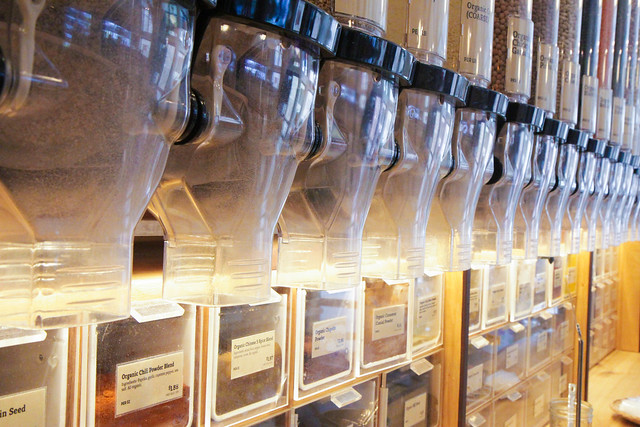
Can you list the local farmers/vendors you work with?
Charm Farm. Backbone Farm. Healthberry Farms. Sickler Farms. Roundright Farms. Firefly Farms. Spring Gap Mountain.
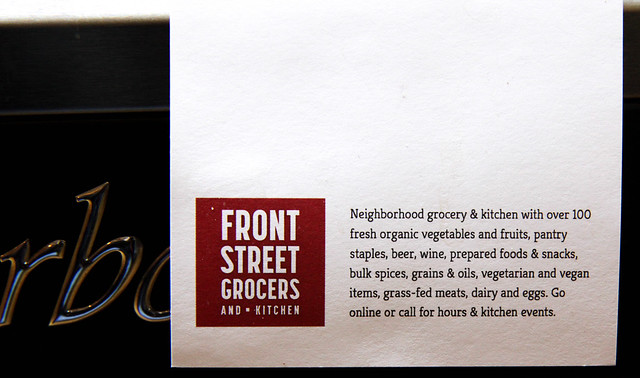
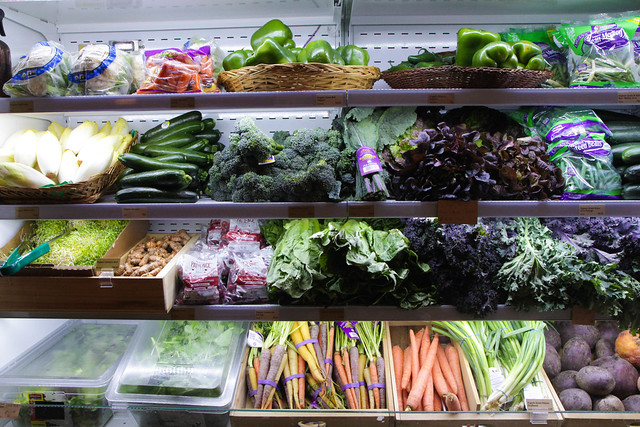
What kind of items do you carry?
We have nearly 1000 different items in our store, which are cateloged in the following subcategories. Regardless of the product, we seek product attributes such as organic, pesticide free, non-gmo, fair-trade, pastured and/or good land stewardship practices. Does every product fit this bill, no, but I would say that over 95% of the products in our store meet at least one of these criteria. We aim to do our best to bring in the best, filter out the bad and strike a balance with value so that what we source is accessible to our community. We are building a business off people who want fresh, wholesome foods - and are focused on their personal health and who support farms and brands that have good practices. Our categories:
1. Organic produce, vegetables & Fruit - 50 to 100 items at any given time. All certified organic or grown using organic practices.
2. Bulk. Grains, flours, herbs, spices, cooking oils, vinegars, whole bean coffee, chocolate covered nuts and espresso beans, legumes, salts, etc. Hundreds of items.
3. Dairy. Yogurts, butters, milks, cheeses, kefir, creamers etc.
4. Fermented. Krauts.
5. Vegan & Vegetarian items. Bulk Tofu, tempeh, mayonnaise, yogurt meat-free sausages, veggie burgers, seitan, etc
6. Dairy Free. Nut Milks, yogurts, dairy-free ice cream, creamers, etc
7. Meats. Pastured, mostly-local, antiobiotic free.
8. Frozen. Ice cream, breads, fruits, vegetables, ice
9. Pantry. Huge selection. Mexican, Italian & asian staples. Chips, salsas, snacks, condiments. Ready to eat meals. Chocolate bars. Pantry makes up about 25% of our store.
10. Beverages. Kombucha, Sparkling waters, ginger beers, juice. Kombucha & sparkling water on tap.
11. Beer & Wine. Beer, wine & ciders. Can buy a single beer or build your own sick pack. Bottles of wine and cider. Wine on tap for those that are eating and/or shopping.
12. Home & Health. Small, but carry the essentials. Paper towels, toilet paper, dish, laundry & hand soaps, scrubbing pads. Lip balms, moisturizers, deodorants, toothbrushes, toothpaste, bars of soap, liquid
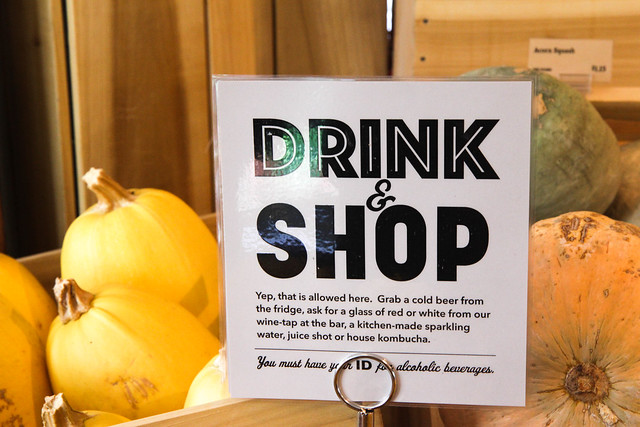
How do you decide what items to carry?
There is a threshold of items that a shop has to carry to become a staple in someone’s shopping habits. To be a grocery we had to cover a lot of bases - as evidence by the 12 categories noted above. How we decide a brand or farmer is based on the attributes of the product. As mentioned before, all our items are evaluated with our Food Ethics Filter which prioritizes beneficial foods over harmful foods.
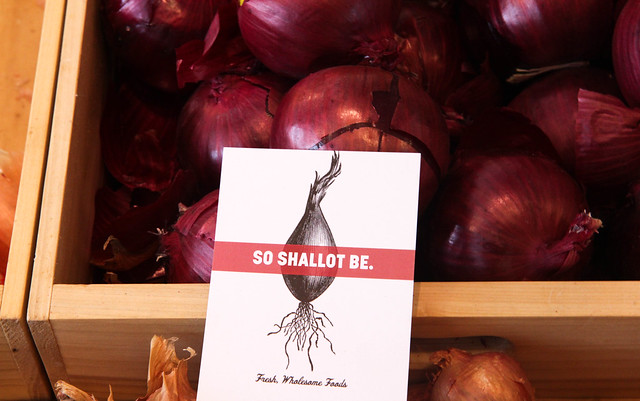
Why do you think it's important for communities to support local groceries?
We see it the other way around. A local grocery is established to support the community and in return, the support is given back. It takes both to tango in this business - but we have to lead. Grocery stores are not easy work. You have to be open daily with expanded hours - whether busy or slow - and you have to be stocked. It’s a vulnerable place to be in this given day and time because people only do a small portion of their spend at local shops anymore. Especially with food. And with the American diet being so diverse, your sourcing has be broad. For example, one night a family might want asian, the next an Italian bake with a huge mixed salad. That means you have to carry a diverse range or product to earn trust and gain the support of a community member. The online world has also taken food retail by storm by entering the dry-good and perishable world. And the newest service on the block, Blue Apron, will certainly have a toll on small food business. Competition is about as fierce as it could be in this space - but there will always be a place for the fresh food outlet. Despite all this food is and will always be a pulse of a community or region and we opened with the hope that providing a warm, pleasant, stocked and regular operating business that we will earn patronage from those who love food, love to cook and appreciate their health - as well as occasional splurge :) We also knew that providing a bulk section would enable people to eat and shop on a budget. There is no better way to save money and eat well than by shopping bulk.
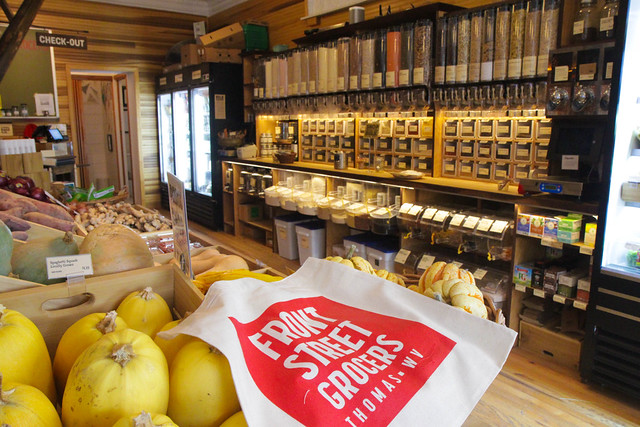
What does shopping at a local grocery do for the community, as opposed to going to a giant chain?
1. Relationship. When people enter our shop, they are greeted, there is eye contact, we know the product and we can help answer questions. We talk, we share stories, we ask how people are doing - we hug. We don’t have 10,000 items - rather we have 1 or 2 of each product type. That allows us to know our product and in return, share that information. It’s simply more human.
2. Health. At a giant chain, it’s about shelf-life. The majority of the store is non-perishable. That means there are more preservatives, higher temperature cooking and therefore less access to nutrients. At a smaller shop like ours, we are filtering out the bad, bringing int the good. This puts health and nutrition at the forefront. Our bottom line is critical, but we are not solely bottom line driven. From the get-go, this was about access to fresh, wholesome foods.
3. Convenience. We are convenient. You can stop in more often because we are small. In 10 minutes you can swing in and be out with that you need rather than meandering through a 50 to 100k white box. For example, rather than looking at 25 types of salsas, you can choose between our 3 or 4. There is another side of convenience, and that has to do with ‘filtering’. Instead of navigating a 100k square foot store for organic and natural foods - we’ve done the work for you. In that, trust is built and with trust comes a form of expediency in the selection process. It’s a hidden side of convenience that isn’t often recognized by shoppers at major chains.
4. Community. We are part of the community. We visit with our customers. We are our customers friends. They spend their money locally and in return, we do to. The proceeds from our store are not going to some corporate headquarter in Columbus or Texas, they remain here.
5. Product Mix. By listening and talking with customers, we have the luxury of building a product mix that is relevant to our community. We don’t have a lot of space to waste, so we can’t carry what doesn’t move. We carry what people here want. Fortunately, in our first months of operation - what we envisioned and what people wanted are mostly in sync.
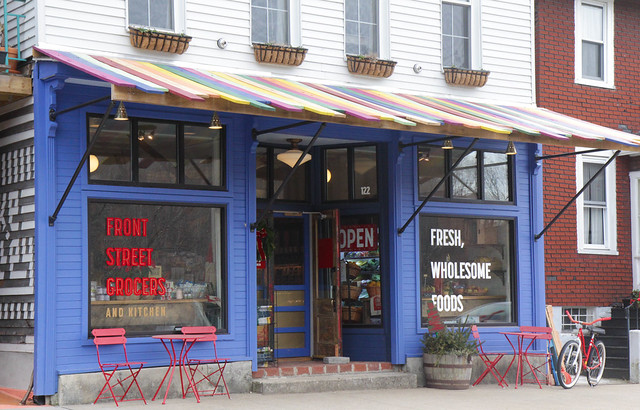
Why do you think this is the first grocery in the neighborhood in quite some time?
1. Economics & Demand. Thomas went through several years where there were only a handful of crusading businesses that remained. Most of the storefronts were barren. Only in the past decade, with the commitment and hard work of many folks and businesses in this community, has Thomas begun to fill its shops again and become the hub it once was. We are merely dovetailing on the energy and commitment of previous business and supporting the community and travelers with a missing component in the business mix here in Thomas.
2. Start-up costs. Grocery stores are expensive to start. There are health code requirements which result in substantial remodel work, expensive equipment and refrigeration merchandising systems, high utility bills, lots of custom shelving, POS & technology requirements for inventory and then the big whammy, once you’ve spent all your money on infrastructure material and labor, is stocking the store. Even for a shop our size, the initial stocking costs well over $25k. Finding an investor or bank that is willing to put up that type of cash for soft goods - things that go bad, is not common. Then there is payroll. You can’t just start with two people, you’ll burn out. You have to have a team from the start and that is a heavy cost while you build your business and earn the trust of customers.
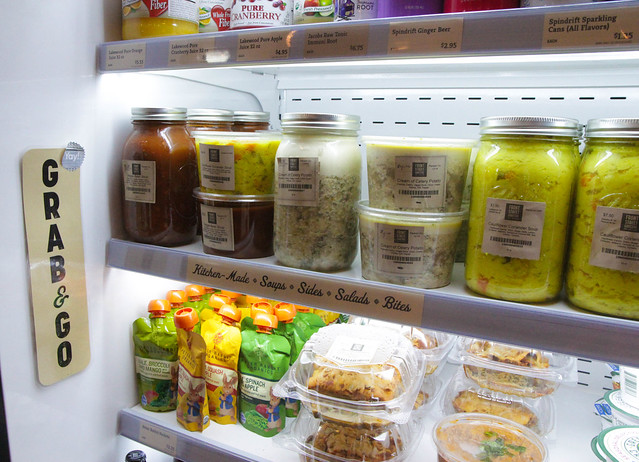
Do you think there is enough local food/customers to sustain this store?
I hope! We are in our first three months of operation. We opened at the tail end of the busy season - despite that, we’ve had a had a stable and gradual growth in the sales. A few weeks have been slow, but as travelers come to our for the winter season - sales have grown and we are ever more confident as word about our shop spreads.
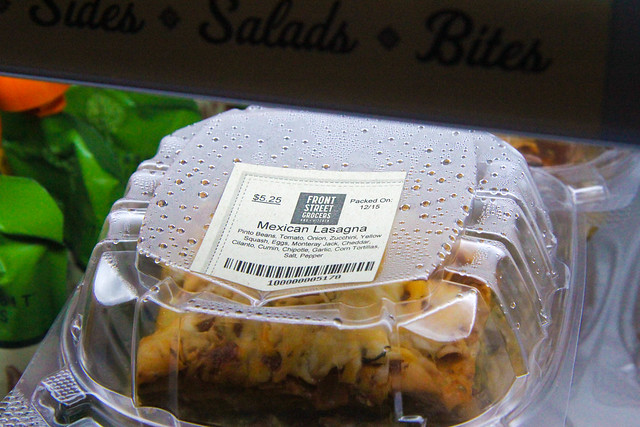
Tell me about the food made on-site - you have grab & go options/soups, right?
Yes. Our GrabNGo products are selling off the shelf - literally. This is not surprising - every new grocery store in urban markets has an extensive prepared foods section. Even the person who loves to cook, doesn’t want to cook all the time - so offering prepared soups, salads, sides, cut fruit, wraps, sushi and snacks is on par with where the grocery world is going. We will add more prepared foods in the months to come. For now, we utilize our organic produce that we have excess of to create nearly all our GrabNGo items. This reduces our waste footprint, but most importantly, ensures we are not losing product that we purchased. From the getgo we knew we would be vulnerable by having so much perishable/fresh produce and foods - so we built in a kitchen to help us process perishables that are near the end of their shelf life. We also use our kitchen as a learning lab/studio for our employees or guest cooks/chefs to come in and refine theirs skills, trial recipes and help serve as a creative outlet for cooks in area.
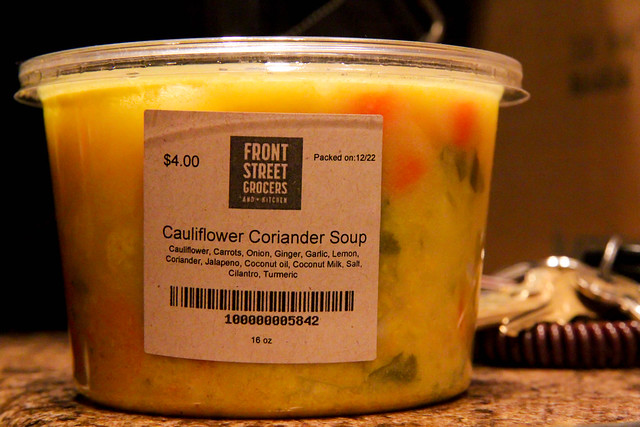
Do you hope to see more local groceries in WV in the future?
Of course! The more local groceries we have throughout West Virginia, the better. It helps set the tone that this is how we shop in West Virginia. As it stands, independent groceries and markets are few and far between - with the majority of people defaulting to chain grocery stores. Retraining how people shop takes time and it takes exposure. It’s up the small groceries to show people that we can cover a lot of bases when it comes to food. We might not have everything someone wants, but we will have everything you need. It’s important for folks to recognize how independent business gets hurt in a culture that alway seeks the cheapest price. With food, that often comes with a health consequence. Small groceries do everything we can to be competitive. Our prices aren’t higher because we are trying to exclusive - our prices are higher because we cannot palletize our purchases like a big chain. Our value add comes in relationship, convenience, community and in a shop like ours, access to organic, high quality foods without having to drive two or three hours.
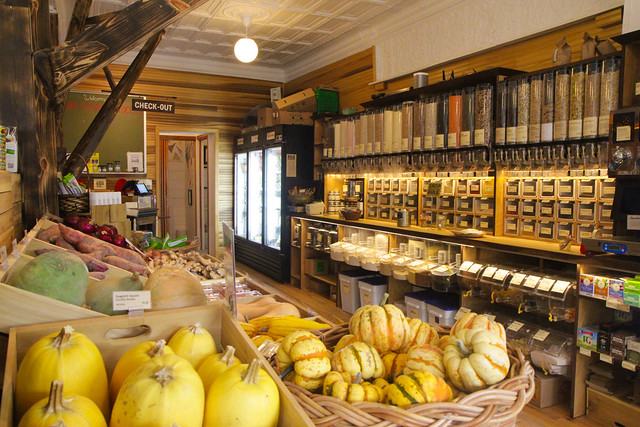

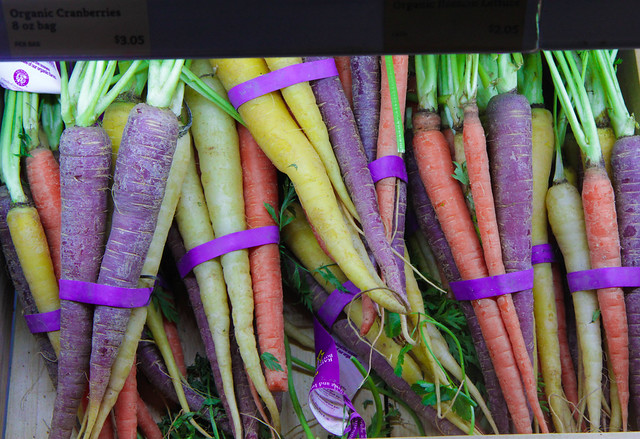
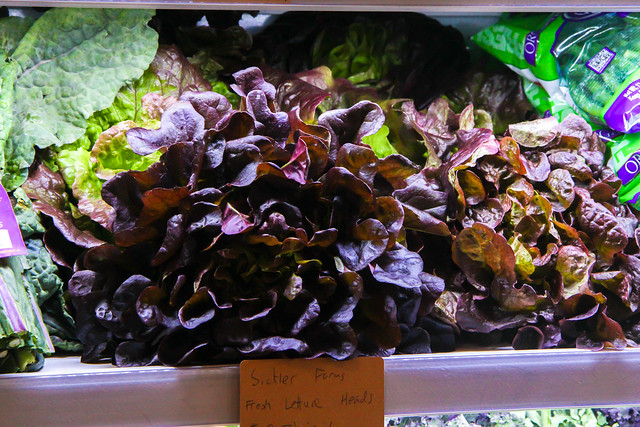
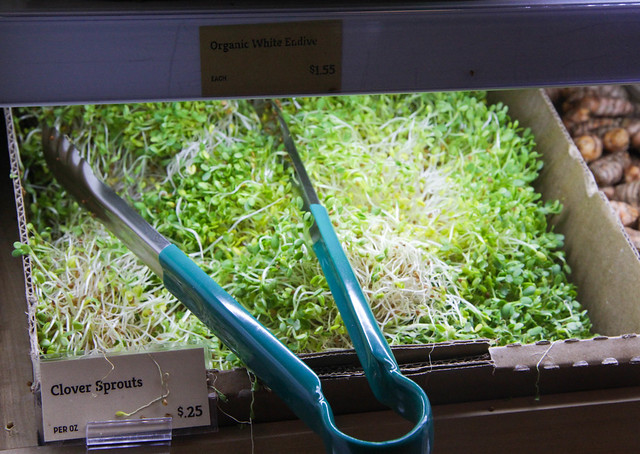

0 comments